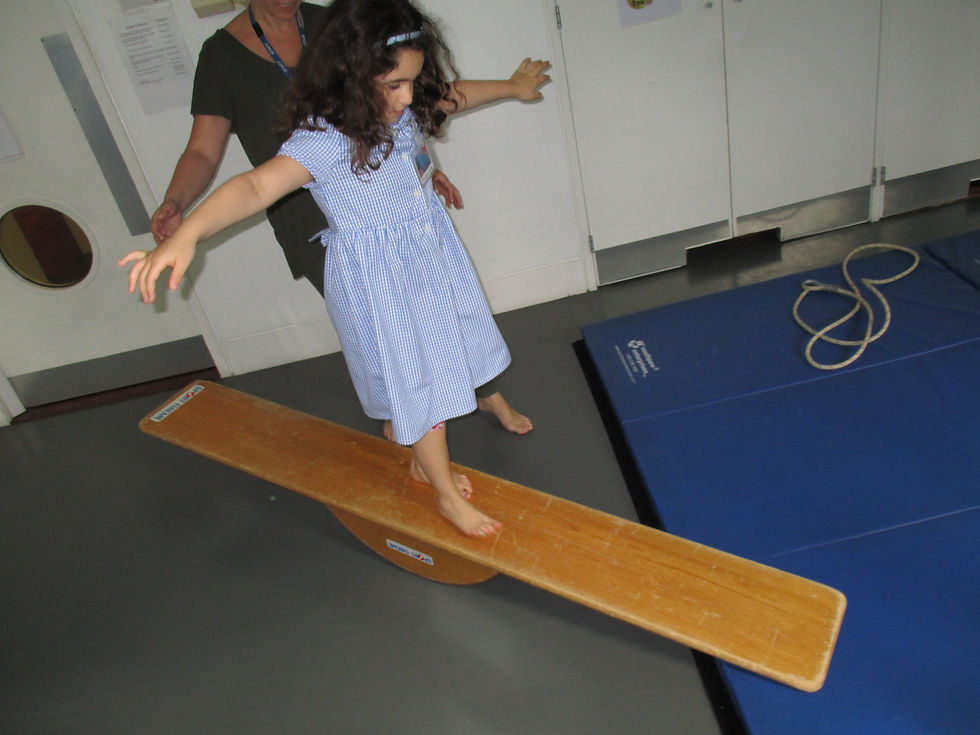





Occupational Therapy
Curriculum Provision
-
OT is integrated into the Lower School curriculum.
-
IEPs are set termly for every child alongside other core subjects.
-
Gross motor learning breaks delivered in ALL curriculum lessons for ALL pupils in Lower School groups.
-
Sensory Integration theory is integral to the teaching strategies implemented in the classrooms across all curriculum subjects.
-
Advice and Education for staff and parents to aid the children in accessing the National Curriculum.
Individual Provision
Pupils who are identified to have a specific need for individual therapy will receive direct one-to-one input weekly.
Small groups
Our pupils have 2 hour Movement sessions each week which is run by our Sensory Integration trained Paediatric OT.
Sensory Diets
Sensory diets are implemented according to individuals’ needs. These may be set to aid the child’s learning and behaviour at school and at home.
Specialist programmes
Specialist programmes delivered to specific individuals or groups depending on their need, such as:
-
The Alert Programme
-
Handwriting Without Tears
-
Write From The Start
-
The Teodorescu Perceptuo-Motor programme.
-
Fed Up - (fussy eaters) Programme
Environmental Adaptations
-
Individualised seating for posture within the classroom.
-
Writing slopes
-
Move ‘n sit cushions
-
Visual aids
Facilities
We have a C-Frame swing, as well as a range of equipment to provide a variety of sensory experiences.
Staff
Our OT is Sensory Integration trained and uses a combined SI and Visual Perceptual Motor approach.
Our therapist works within a multi-disciplinary team and is therefore able to provide integrated classroom support and behavioural strategies devised in conjunction with school behavioural specialist. The therapist works closely alongside speech and language therapists using strategies such as the MORE approach to improve oral-motor skills.
Daily Living Skills: The Speech & Language Therapists and Occupational Therapists jointly deliver the sessions to pupils in the Lower School. These collaborative sessions develop the pupil's communication skills, social awareness and overall independence. Topics covered in these sessions include hygiene, dressing, personal safety and food preparation. These sessions also incorporate community visits where the pupils carry out functional tasks such as buying items in a shop, ordering a beverage at a café or borrowing a book at the library. At the end of each session, the pupils are encouraged to reflect on their own performance in each daily living activity. This supports the pupils to increase their self-awareness of their own strengths and needs so that they can use these strengths to harness their areas of difficulty.
The integration of approaches from two disciplines enables the pupils to learn functional vocabulary and appropriate social behaviour whilst simultaneously acquiring the skills to plan and carry out an activity of daily living in sequence. The SLTs and OTs collaboratively deliver interactive parent workshops where they demonstrate the skills explored in these sessions. Parents can then promote these independence skills within the home environment to support generalisation.
Classroom Skills Sessions: is delivered by the Occupational Therapist. The general aims of Classroom Skill sessions are to increase the children’s confidence and independence with everyday tasks they are faced with in the classroom environment.
For example:
-
Using a ruler to draw a straight line
-
Using a ruler to measure
-
Sharpening pencils and using a rubber
-
Using a hole punch
-
Cutting and sticking down worksheets
-
Tidying up after ourselves
-
Completing worksheets
By working on these more functional skills, the children will be developing their general fine motor skills, and at the same time increasing their independence in the classroom. This will also prepare them for learning how to organise themselves appropriately as they transition up the school and are required to become more independent.
Although pupils work on functional tasks they also focus on the underlying fine motor and visual perceptual skills needed to complete these classroom tasks.
For example:
-
Improving body awareness in space
-
Increasing shoulder girdle strength
-
Developing postural control
-
Increasing finger strength
-
Improving dexterity and in-hand manipulation
-
Improving pencil control, wrist extension and encouraging an open web space
-
Developing visual perception skills
-
Sequencing and following instructions
